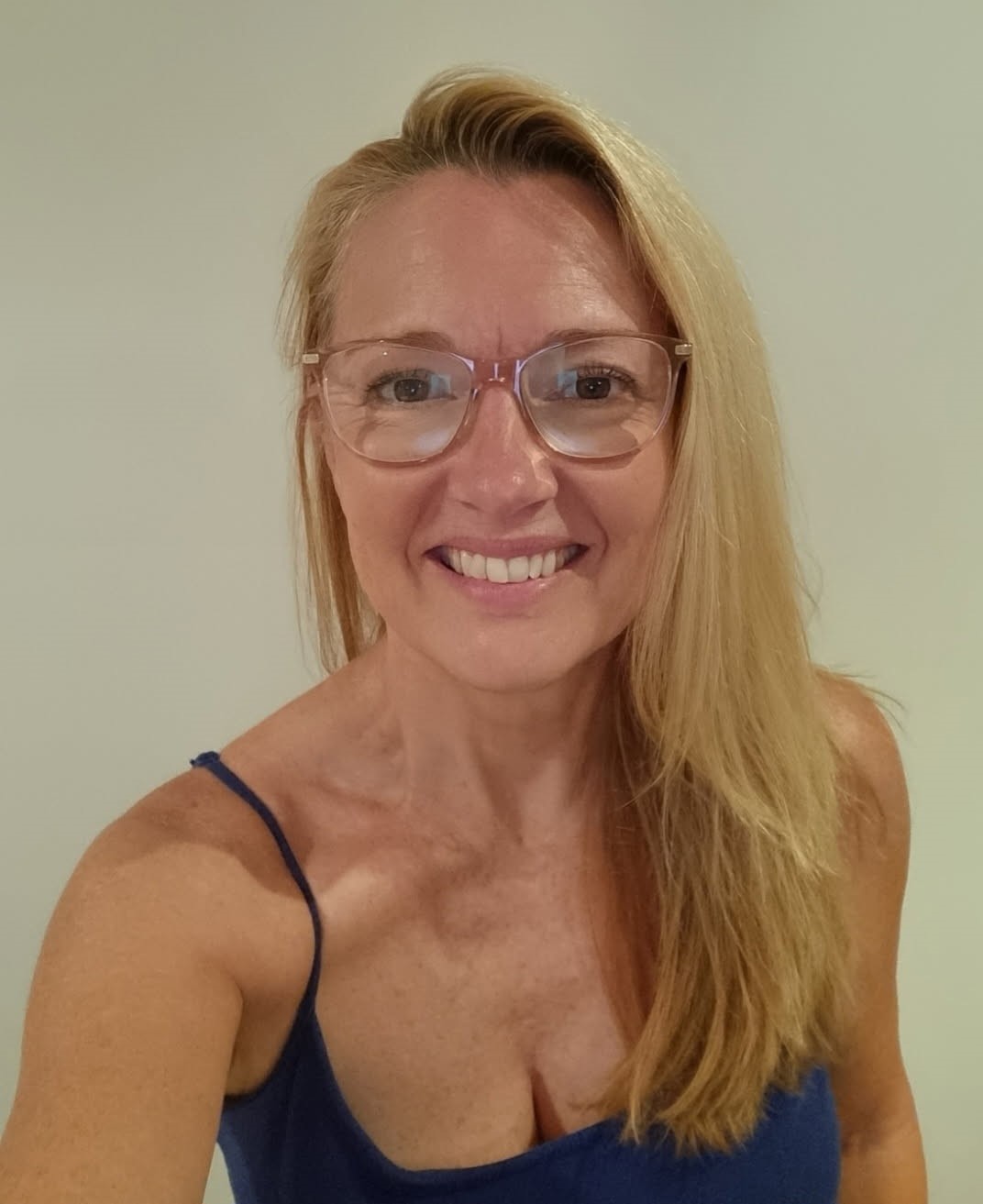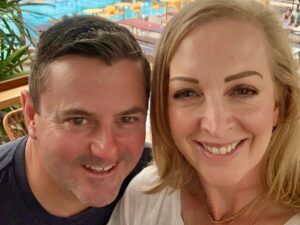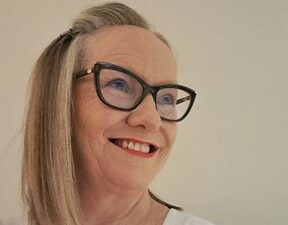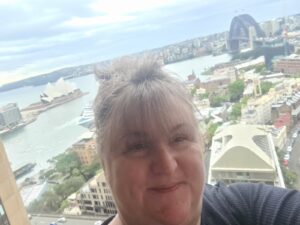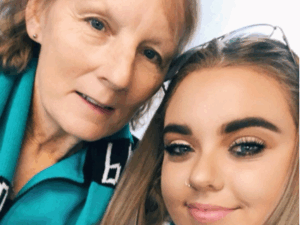They found my original tumour incidentally. I had absolutely no awareness that I was walking around with a rare tumour inside and that I was essentially like a ticking time bomb. I went for a routine CT scan due to some lower leg pain and vaginal bleeding. Having previously undergone a hysterectomy, a CT scan was scheduled to determine the cause of any issues. Abdominal adenoma was the original diagnosis, and a follow-up scan was suggested. It was this second CT scan that would change my world entirely.
I found myself sitting with my GP, hearing the name of my tumour and asking her to write down the word PHEOCHROMOCYTOMA because I had never heard of it and knew I would not remember it. Looking back, I can see the irony in my thinking because that word Pheochromocytoma and everything about the tumour was soon to consume my life. From the initial diagnosis to the surgery only 3 weeks later, my life became a whirlwind of scans and appointments. Alpha blockers. Beta blockers. Monitoring my heart rate. All the while I was working. Which may sound crazy but looking back, I truly think I just needed some sense of normalcy in an utterly discombobulating time.
One moment my life was normal, and in a blink, it had been turned upside down. Blood tests. 24-hour urine tests. CT scans. PET scans. Doctors and specialist appointments became my norm. I gained an endocrine specialist. Specialist surgeon. Genetic specialist. Heart specialist. I averaged 4 appointments each month in a good month. I had an amazing team of specialists who were proactive and helpful. I went from the original CT to a life-threatening adrenalectomy surgery within the space of just three weeks. It felt like the whacky boat ride in the original Willy Wonka movie where the world was spinning and the psychedelic symbols were whizzing past, and no one knew up from down. Yet even that doesn’t really come close to describing how things were or how I felt.
To try and make sense of the chaos, I learnt a lot about this disease on the fly. I’m a bit of a science geek, so I found myself doing a lot of my own research. I found out everything I could about pheochromocytomas and paragangliomas. I literally immersed myself in the world of NETs.
One of my brothers passed away at age 42 from a NET in 2005 and very little was known about his cancer back then. Two people in one family being diagnosed with a NET seemed like a remarkable stroke of bad luck – so I wondered if there may have been a genetic link and researched this as well. I wanted to try and understand as much as I could about this disease to try and make sense of what was happening in my world. I started a medical notebook of myself and printed out scan results, blood test results, plus I included my research. I carried it to every appointment. This book genuinely became helpful. I was able to refer to it when I was speaking to my specialists and more importantly, it gave me a sense of calm in amongst the medical complexities.
My entire world felt like it was about this disease yet a lot of folks around me had no clue. No one had really heard about this kind of cancer, and it became too hard to explain the disease and rehash the information while I was trying to make sense of everything within myself. I felt like I was living a dual existence. In one corner I was a single Mum supporting my son while he completed Year 12 and the end of his schooling days. After losing my own Mum (and his beloved Grandmother) only two years prior, I wanted his world to feel calm while he finished his studies. I was going about my days as usual, being a teacher and just trying to feel some sense of sanity in amongst the chaos. Then, in the opposite corner, I was also navigating the unknowns of a rare cancer. Even to this day it honestly feels surreal. I know I have been through this whacky journey but at the same time, I often feel like it was all a dream. An extremely bad dream.
Post surgery, after my adrenalectomy and removal of the tumour, it was assumed that my body would return to normal. That my remaining adrenal would pick up the slack and everything would be relatively the same. Unfortunately, that wasn’t the case. My body doesn’t seem to play by the rules of ‘normal’. My heart was unable to regulate itself. I still suffered from chest pains, elevated blood pressure and tachycardia. I was on beta blockers for this, but I was concerned that if there was another tumour present that I was placing myself at risk. Since my body had not been following the standard recovery, my specialist team was pondering if it may just require additional time to return to its own status quo. My blood tests also continued to show that I had elevated metanephrines and so I was being monitored for this as well. 18 months post-surgery, these levels are still elevated and/or fluctuating and I continue to have PET scans and blood tests while my specialist team try and determine the cause.
NETs are isolating. The journey has been isolating. I have been in hospitals, and the medical professionals weren’t aware of this disease. General nursing staff have looked at me blankly when I have explained that I have elevated metanephrines and that there are anaesthetic complications that can arise from this disease. In my original surgery to remove the tumour, I had to spell the name of my disease to some of the medical staff because they had never heard of this particular cancer. I also found myself explaining my medication as a result. Time and again I was advocating for myself to medical professionals simply because there isn’t enough mainstream medical awareness about NETs. It was soul crushing to be surrounded by medical folk yet feeling like I was the only one in the room who knew anything about my disease. In some of my medical appointments I would often mention something I had discovered while doing my own research, only to feel like I was either being dismissed…with the reason for the symptoms always being labelled as menopause, or alternatively, it felt like I was considered as an anxious patient. The frustrating part now is that every subsequent ache or pain is simply chalked up to menopause. I never knew the loss of one adrenal gland would cause such an altered existence within my own body.
Neuroendocrine Cancer is still relatively unknown. And within that, there are a lot of unanswered questions simply because of the nature of the disease. In my appointments I have asked countless questions about symptoms or things post-surgery and the consensus has often been the same. I’ve heard, “your particular cancer and surgery are rare we don’t know a lot about them” and I’m often told “I just don’t know the answer”. It’s quite confronting to hear that even medical folk don’t know the answers about NETs. Only to see that there is awareness about other ‘known’ cancers in the public arena and to see how much funding goes their way. These cancers have often been of loved ones of high-profile people and subsequently, the general public and society were made aware. I find myself wishing that I was a celebrity because then maybe my words about NETs would reach a greater audience or make a greater impact. To feel that my cancer story is less important simply due to my social status is something I struggle with.
NETs is not a new cancer. On my pheochromocytoma journey, and due to a family history of NETs, I was referred to a genetic specialist for testing. From this, and due to having a rare adrenal tumour, I was also invited to participate in a research project. I was referred to a wonderful scientist from the Kolling Institute of Medical Research in NSW. In our conversations, she mentioned that she had been researching PCCs and PGLs since the early 2000s. Yet without adequate funding, there is only so much research they can achieve in the study of pheochromocytomas and paragangliomas and so any information that I could share would be of great benefit. I was more than happy to help so that the next patient with a pheochromocytoma might be able to walk a smoother medical road.
I find it baffling how there can be lines drawn in the sand on which cancers get funding and which ones don’t…and why. NETs are just as scary as the other more well-known cancers. The cloud of cancer still hangs over your head even with a cancer classed as rare. And something is only rare until it happens to you. Then rare takes on a whole new meaning.
I have had various tests and scans along my pheochromocytoma journey. One of these is a Dotatate PET scan. A scan in which a particular isotope is passed into my body which then shows up on the screen to help diagnose my original tumour and to also help monitor any subsequent tumour growth that may be occurring. These scans cost $600 and have a disclaimer attached that says “not all Dotatate PET scans are covered by Medicare. They are dependent on your medical history or current condition as reflected by your referral”. This always blows my mind. That while undertaking an incredibly daunting procedure – a scan to determine my fate, that there are no available rebates. None. No Medicare rebate at all.
The reason for the scan is frightening enough on its own, and then the added weight of the cost becomes an even greater burden. It’s not something anyone needs or deserves. In just 18 months, since my original diagnosis, I have had 4 PET scans due to elevated tumour markers. Let alone the other scans and countless blood tests. Then to add insult to injury, when I went for my latest PET scan, I was informed that the cost for these has now increased to $630. Why? Why is my PET scan now even more expensive?
I was diagnosed with a rare adrenal tumour, a pheochromocytoma, in late February 2024. Yet I only recently heard about the NET Nurses. I only discovered them a few months back through a Facebook link to NECA. I randomly stumbled upon them. I wish my specialist team had informed me about them at my initial diagnosis because it was an incredibly lonely road back then due to how rare these tumours are. To know that there was support available would have been incredible. Yet my specialist team weren’t aware that the NET Nurses existed. After outlining the NET Nurses and NECA in a recent visit with my specialist surgeon, he requested phone numbers and email addresses and noted that he would be sharing them with his NET patients. He also really loved my idea about NET Nurse pamphlets, asking whether I had any with me. He mentioned that if these were available that he would appreciate having some to share with future patients.
For me, finding the NECA NET Nurse has been life changing. From the first moment of contact, I had this incredible sense of being seen and more importantly being heard. It felt like a weight had lifted off my shoulders. I was able to share my own findings and ask questions, and this was welcomed. I asked the NET Nurse if other pheochromocytoma adrenalectomy patients have been left with the same symptoms. We chatted about many things regarding my journey. I explained that I had done a lot of my own research and quite often this is met with a sense that I should be leaving that to the professionals. Yet, instead of feeling like this was the case, the NET Nurse commended me on already knowing so much about this disease. She also sent me additional information and articles to read. She offered advice and specialised NETs counselling and most importantly…she listened. I got off the phone from speaking to the NET Nurse and broke down in tears from a sense of relief from finally feeling support in such a whirlwind year. It was a time in my pheochromocytoma journey where I truly felt medically supported. That initial phone call to the NET Nurse made me feel like I had been wrapped up in a supportive hug…and I didn’t feel alone.
The role of the support crew for someone going through cancer also brings its own hardships for those involved. Had I known about the NET Nurses at the beginning of my Pheo journey, then the burden of support may not have fallen as heavily as it did on my family.
What I would have given to have a nurse trained in these particular tumours to help alleviate the stress along the way. To have a NET Nurse at my original surgery – someone who knew what elevated metanephrines meant. Someone who I could speak to and who was there for support – who understood exactly what I was going through. This would have been priceless.
I feel like this only scratches the surface of what I have been through over the past 18 months. I’m not sure I would ever be able to fully convey the complexities and the emotions that have occurred on my cancer journey. It honestly feels like the time before pheochromocytoma and the time after.
It has made me stronger while also breaking me. It has been an emotional ride and one that has left me with a desire to advocate for NETs awareness. In honour of my brother who lost his life to NETs. To honour myself and my own NET journey. For all those who have been touched by Neuroendocrine cancer.

